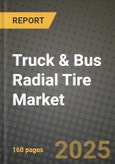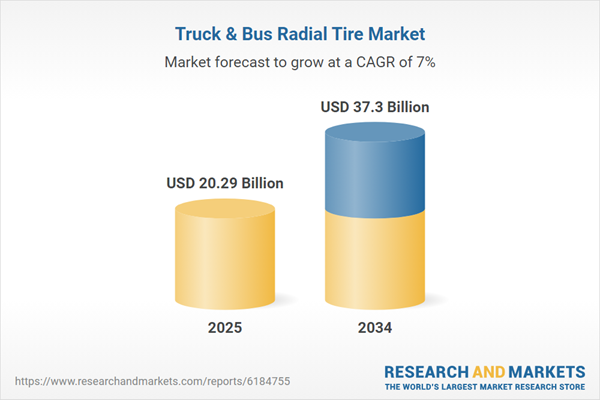Truck & Bus Radial Tire Market
Truck & bus radial (TBR) tires are engineered for high-load, high-mileage duty cycles across long-haul, regional, urban bus, and mixed/off-road applications. Value is defined by total cost of ownership - fuel efficiency, tread life, retreadability, uptime, and casing resale - supported by compounds, steel-belt architecture, bead packages, and footprint control tuned to route and axle position. Replacement demand dominates and is shaped by freight cycles, public transit budgets, and construction activity, while OEM fitments mirror platform shifts toward lighter chassis, aerodynamic tractors, and alternative powertrains. Regulatory pressure on safety, noise, and emissions pushes low-rolling-resistance designs, winter/grip lines, and labeling compliance. Fleets increasingly pair tires with telematics, TPMS, RFID, and service-level agreements to manage pressure, alignment, and wear, turning tires into data-rich assets. Retreading remains a strategic lever - casings designed for multiple lives, automated inspection, and bead-to-bead processes compress lifecycle cost and waste. Supply dynamics reflect raw-material volatility (natural/synthetic rubber, carbon black, steel cord), trade measures, and regionalization; manufacturers balance mega-plants with local mixing and distribution to stabilize lead times. Electrification in buses and early-stage trucks introduces higher torque, axle loads, and regen-braking heat, prompting reinforced constructions and new tread chemistries. Sustainability themes - reduced PAH oils, recycled/recovered inputs, extended producer responsibility, and end-of-life recovery - are moving from pilots to procurement criteria. Competitive advantage now blends product performance with networked service, digital monitoring, and circularity programs that prove uptime and cost outcomes across diverse duty cycles.Truck & Bus Radial Tire Market Key Insights
- Replacement leads, OEM sets specs. Replacement volumes track freight and transit utilization; OEM fitments shape next-gen patterns and sizes, especially for low-drag tractors and city buses with tighter noise and wet-grip targets.
- TCO is the buying center. Fleets optimize cost per kilometer through longer tread life, fuel-efficient compounds, and high casing value. Warranty terms, multi-life retread programs, and roadside service responsiveness tip awards.
- Rolling resistance vs. durability trade-offs. Silica-rich treads, advanced belt packages, and footprint control lower hysteresis without sacrificing wear. Line-haul skus emphasize fuel, while regional/mixed service prioritize chip-cut resistance and robustness.
- Electrification raises duty severity. Higher torque and weight, plus regen braking, increase heat and irregular wear risk. Tires adopt reinforced beads/sidewalls, optimized sipe density, and compounds with improved thermal stability for e-bus and e-truck axles.
- Retread ecosystems are strategic. Shearography, automated buffing, and bead-to-bead retreads extend casing life and deliver material savings. Casing management and traceability platforms turn retreading into a managed service, not a commodity.
- Connected tires become standard. TPMS, RFID, and telematics feed predictive maintenance and pressure/temperature alerts. Subscription models bundle hardware, analytics, and service calls, reducing blowouts and improving fuel economy.
- Vocational niches require specialization. Construction, waste, logging, and mining favor stone-ejector designs, reinforced undertreads, and sidewall protection. Urban bus lines optimize curb-scrub resistance, wet grip, and low noise.
- Supply resilience matters. Rubber, carbon black, and steel cord swings drive price and allocation risk; diversified sourcing, regional plants, and local warehousing stabilize fleet contracts and dealer inventories.
- Sustainability is now a spec. Recovered carbon black, lower-impact oils, confirmed recyclability, and EPR participation influence public tenders and large fleet RFPs. Transparent lifecycle documentation strengthens bids.
- Channels are professionalizing. Dealer networks, mobile fitting, and on-site yard services compete with e-commerce ordering portals. SLAs with uptime guarantees and integrated billing for tires, retreads, and services win multi-year awards.
Truck & Bus Radial Tire Market Reginal Analysis
North America
Demand is anchored in long-haul and regional freight with high retread penetration. Fleets emphasize fuel-efficient line-haul patterns and robust regional all-positions, supported by TPMS mandates in procurement and telematics bundling. Harsh winter and vocational segments require three-peak mountain snowflake and cut-resistant lines. Trade measures and raw-material swings favor suppliers with regional mixing, casing buy-back programs, and dense service networks that minimize downtime on interstate corridors.Europe
CO₂ and noise regulations, clean-air zones, and rigorous labeling elevate low-rolling-resistance, wet-grip, and winter-certified skus. Urban bus contracts prioritize low noise and curb-scrub endurance, while international haulage focuses on fuel and even wear. Retreading is mature, with multi-life casings and audited plants standard. OEM platform shifts and growing e-bus fleets drive reinforced constructions. Supply is balanced between regional plants and imports, with just-in-time distribution and seasonal tire changeovers shaping logistics.Asia-Pacific
APAC leads in manufacturing scale and route diversity - from express logistics to heavy vocational. China and India drive replacement volumes, with rising adoption of fuel-efficient patterns as freight digitizes. Japan, Korea, and Australia prioritize premium casings and disciplined maintenance, while Southeast Asia blends cost sensitivity with growing retread acceptance. Government infrastructure programs support mixed-service demand; e-bus rollouts in major cities pull specialized urban patterns and connected-tire packages.Middle East & Africa
Hot climates, long routes, and mixed pavement conditions demand heat-resistant compounds, strong bead areas, and cut-chip protection. Fleet outsourcing and contract logistics expand, valuing dealer coverage, mobile fitting, and quick casing turnaround. Urban transit investments focus on durable, low-noise bus lines. Import reliance keeps attention on lead times and total landed cost; distributors with inventory depth and retread capability gain share.South & Central America
Regional corridors, agriculture, and mining shape a mix of long-haul and severe-duty needs. Retreading is a key cost lever, with fleets favoring high-value casings and reliable plant quality. Currency volatility elevates preference for local stockholding and flexible contracts. Urban BRT systems sustain bus-specific demand, while rugged designs serve secondary roads. Suppliers win with training, pressure management programs, and integrated offers that stabilize operating costs through cycles.Truck & Bus Radial Tire Market Segmentation
By Application
- Trucks
- Buses
By Sales Channel
- Aftermarket
- OEMs
Key Market players
Bridgestone, Michelin, Goodyear, Continental, Pirelli, Yokohama, Hankook, Kumho Tire, Apollo Tyres, MRF, CEAT, Zhongce Rubber (Westlake), Sailun, Giti Tire, Double CoinTruck & Bus Radial Tire Market Analytics
The report employs rigorous tools, including Porter’s Five Forces, value chain mapping, and scenario-based modelling, to assess supply-demand dynamics. Cross-sector influences from parent, derived, and substitute markets are evaluated to identify risks and opportunities. Trade and pricing analytics provide an up-to-date view of international flows, including leading exporters, importers, and regional price trends.Macroeconomic indicators, policy frameworks such as carbon pricing and energy security strategies, and evolving consumer behaviour are considered in forecasting scenarios. Recent deal flows, partnerships, and technology innovations are incorporated to assess their impact on future market performance.
Truck & Bus Radial Tire Market Competitive Intelligence
The competitive landscape is mapped through proprietary frameworks, profiling leading companies with details on business models, product portfolios, financial performance, and strategic initiatives. Key developments such as mergers & acquisitions, technology collaborations, investment inflows, and regional expansions are analyzed for their competitive impact. The report also identifies emerging players and innovative startups contributing to market disruption.Regional insights highlight the most promising investment destinations, regulatory landscapes, and evolving partnerships across energy and industrial corridors.
Countries Covered
- North America - Truck & Bus Radial Tire market data and outlook to 2034
- United States
- Canada
- Mexico
- Europe - Truck & Bus Radial Tire market data and outlook to 2034
- Germany
- United Kingdom
- France
- Italy
- Spain
- BeNeLux
- Russia
- Sweden
- Asia-Pacific - Truck & Bus Radial Tire market data and outlook to 2034
- China
- Japan
- India
- South Korea
- Australia
- Indonesia
- Malaysia
- Vietnam
- Middle East and Africa - Truck & Bus Radial Tire market data and outlook to 2034
- Saudi Arabia
- South Africa
- Iran
- UAE
- Egypt
- South and Central America - Truck & Bus Radial Tire market data and outlook to 2034
- Brazil
- Argentina
- Chile
- Peru
Research Methodology
This study combines primary inputs from industry experts across the Truck & Bus Radial Tire value chain with secondary data from associations, government publications, trade databases, and company disclosures. Proprietary modeling techniques, including data triangulation, statistical correlation, and scenario planning, are applied to deliver reliable market sizing and forecasting.Key Questions Addressed
- What is the current and forecast market size of the Truck & Bus Radial Tire industry at global, regional, and country levels?
- Which types, applications, and technologies present the highest growth potential?
- How are supply chains adapting to geopolitical and economic shocks?
- What role do policy frameworks, trade flows, and sustainability targets play in shaping demand?
- Who are the leading players, and how are their strategies evolving in the face of global uncertainty?
- Which regional “hotspots” and customer segments will outpace the market, and what go-to-market and partnership models best support entry and expansion?
- Where are the most investable opportunities - across technology roadmaps, sustainability-linked innovation, and M&A - and what is the best segment to invest over the next 3-5 years?
Your Key Takeaways from the Truck & Bus Radial Tire Market Report
- Global Truck & Bus Radial Tire market size and growth projections (CAGR), 2024-2034
- Impact of Russia-Ukraine, Israel-Palestine, and Hamas conflicts on Truck & Bus Radial Tire trade, costs, and supply chains
- Truck & Bus Radial Tire market size, share, and outlook across 5 regions and 27 countries, 2023-2034
- Truck & Bus Radial Tire market size, CAGR, and market share of key products, applications, and end-user verticals, 2023-2034
- Short- and long-term Truck & Bus Radial Tire market trends, drivers, restraints, and opportunities
- Porter’s Five Forces analysis, technological developments, and Truck & Bus Radial Tire supply chain analysis
- Truck & Bus Radial Tire trade analysis, Truck & Bus Radial Tire market price analysis, and Truck & Bus Radial Tire supply/demand dynamics
- Profiles of 5 leading companies - overview, key strategies, financials, and products
- Latest Truck & Bus Radial Tire market news and developments
Additional Support
With the purchase of this report, you will receive:- An updated PDF report and an MS Excel data workbook containing all market tables and figures for easy analysis.
- 7-day post-sale analyst support for clarifications and in-scope supplementary data, ensuring the deliverable aligns precisely with your requirements.
- Complimentary report update to incorporate the latest available data and the impact of recent market developments.
This product will be delivered within 1-3 business days.
Table of Contents
Companies Mentioned
- Bridgestone
- Michelin
- Goodyear
- Continental
- Pirelli
- Yokohama
- Hankook
- Kumho Tire
- Apollo Tyres
- MRF
- CEAT
- Zhongce Rubber (Westlake)
- Sailun
- Giti Tire
- Double Coin
Table Information
| Report Attribute | Details |
|---|---|
| No. of Pages | 160 |
| Published | November 2025 |
| Forecast Period | 2025 - 2034 |
| Estimated Market Value ( USD | $ 20.29 Billion |
| Forecasted Market Value ( USD | $ 37.3 Billion |
| Compound Annual Growth Rate | 7.0% |
| Regions Covered | Global |
| No. of Companies Mentioned | 15 |









